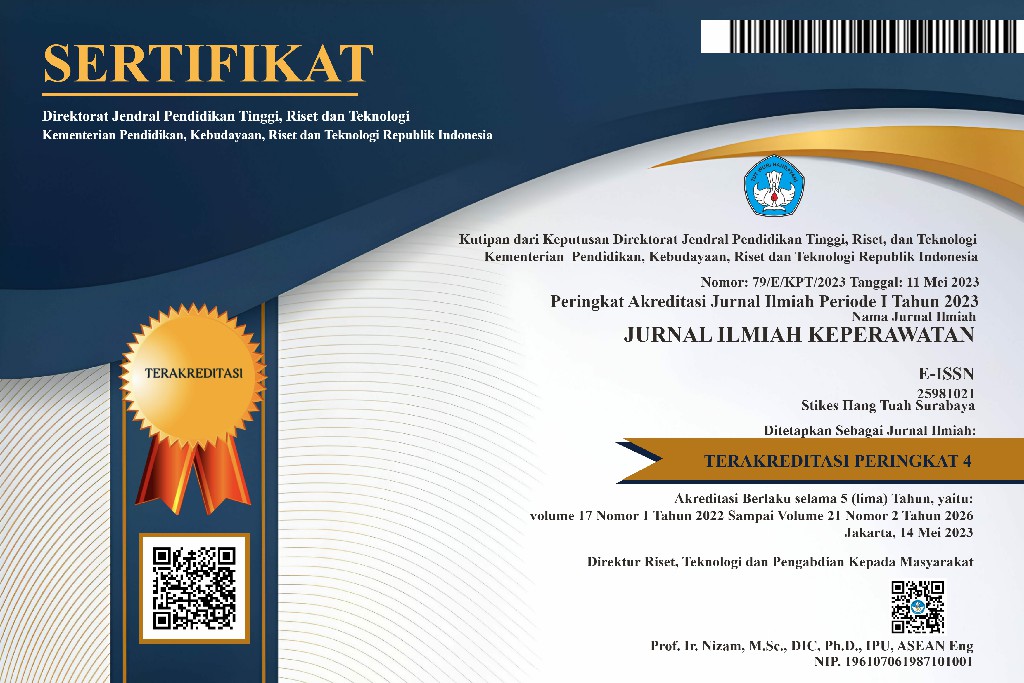Hubungan Efikasi Diri, Kepatuhan dan Dukungan Keluarga Dengan Manajemen Diri Penderita Diabetes Mellitus Tipe 2 di Surabaya
DOI:
https://doi.org/10.30643/jiksht.v17i1.160Keywords:
Efikasi Diri, Dukungan Keluarga, Manajemen diri, Diabetes Melitus Tipe 2Abstract
Introduction: Diabetes care is complex, requiring long-term care and support. Diabetics face challenges in managing themselves by making the right decisions every day, so people with diabetes mellitus often experience decreased motivation, hopelessness decreased capacity to manage diabetes and, difficulty reducing habits or routines that take. Objectives: The purpose of this study was to identify the relationship of self-efficacy, compliance and family support with self-management of people with DMT2. Methods: The design of this study is a cross-sectional approach. The relationship between one and several variables is expressed by the magnitude of the correlation coefficient and statistical significance. The research population was 165 people, the sample size based on Isaac & Michael's table with an error rate of 10% was 103 respondents. The sampling technique is done by non-probability sampling that is purposive sampling. Results: The results showed that there was a significant relationship between self-efficacy (P-Value 0.042), compliance (P-Value 0.001) and family support (P-Value 0.035), with self-management. Conclusions: Based on the results of the study, it can be concluded that in this study self-management of patients with type 2 diabetes mellitus was associated with self-efficacy, compliance and family support. DMT2 sufferers who have good self-efficacy will help them in managing self-management well, as well as compliant DMT2 patients will also have good self-management. Good family support for people with DMT2 will have a good impact on their self-management.
Downloads
References
Adinata, A. A., Nursalam, & Triharini, M. (2020). Family, Teacher, and Peer-Support for the Dental Health Behavior among School-Age Children. International Journal Nursing Anh Health Services, 3(3), 374–380. https://doi.org/10.35654/ijnhs.v3i3.223
Balitbangkes. (2018). Laporan Nasional Riset Kesehatan Dasar 2018. In Badan Penelitian dan Pengembangan Kesehatan (p. 198). http://labdata.litbang.kemkes.go.id/images/download/laporan/RKD/2018/Laporan_Nasional_RKD2018_FINAL.pdf
Bandura, A. (1997). Self-Efficacy: The Exercise of Control.
Clara, H., Irawaty, D., & Dahlia, D. (2021). Self-Efficacy as a Predictor of Self-Management Behavior Practice Among People with Type 2 Diabetes Mellitus (T2DM). KnE Life Sciences, 440–453. https://doi.org/10.18502/kls.v6i1.8633
Damayanti, S., N, N., & Kurniawan, T. (2015). Dukungan Keluarga pada Pasien Diabetes Melitus Tipe 2 dalam Menjalankan Self-Management Diabetes. Jurnal Keperawatan Padjadjaran, 2(1). https://doi.org/10.24198/jkp.v2i1.81
Friedman, Marylin, M., Bowden, V. R., & Jones, E. G. (2010). Buku Ajar Keperawatan Keluarga: Riset Teori & Praktik Ed.5 (5th ed.). EGC.
Galuh, L., & Prabawati, D. (2021). Hubungan Dukungan Keluarga Terhadap Self- Management dan Kadar Gula Darah Pasien Diabetes. Hubungan Dukungan Keluarga Terhadap Self_ Management Dan Kadar Gula Darah Pasien Diabetes, 9(1), 49–55.
Hestiana, D. W. (2017). Faktor-Faktor Yang Berhubungan Dengan Kepatuhan Dalam Pengelolaan Diet Pada Pasien Rawat Jalan Diabetes Mellitus Tipe 2 Di Kota Semarang. Journal of Health Education, 2(2), 137–145. https://doi.org/10.15294/jhe.v2i2.14448
International Diabetes Federation. (2015). International Diabetes Federation. In Diabetes Research and Clinical Practice (7 (Seventh, Vol. 102, Issue 2). International Diabetes Federation. https://doi.org/10.1016/j.diabres.2013.10.013
Mahfouz, E. M., & Awadalla, H. I. (2011). Compliance to Diabetes Self-Management in Rural El-Mina, Egypt. Central European Journal of Public Health, 19(1), 35–41. https://doi.org/10.21101/cejph.a3573
Mayberry, L. S., & Osborn, C. Y. (2012). Family Support, Medication Adherence, and Glycemic Control Among Adults With Type 2 Diabetes. Diabetes Care, 35(6), 1239–1245. https://doi.org/10.2337/dc11-2103
Passer, M. W., & Smith, R. E. (2003). Psychology: The science of mind and behavior, 2nd ed. https://psycnet.apa.org/record/2004-18638-000
Reyes, J., Tripp-Reimer, T., Parker, E., Muller, B., & Laroche, H. (2017). Factors Influencing Diabetes Self-Management Among Medically Underserved Patients With Type II Diabetes. Global Qualitative Nursing Research, 4, 233339361771309. https://doi.org/10.1177/2333393617713097
Sahlan Zamaa, M., & Sainudin, S. (2019). Hubungan Kepatuhan Pengobatan Dengan Kadar Gula Darah Sewaktu Pada Pasien Diabetes Melitus Tipe II. Jambura Nursing Journal, 1(1), 11–18. https://doi.org/10.37311/jnj.v1i1.2057
Soelistijo, S. A., Lindarto, D., Decroli, E., Permana, H., Sucipto, K. W., Kusnadi, Y., Budiman, Ikhsan, M. R., Sasiarini, L., & Sanusi, H. (2019). Pengelolaan Dan Pencegahan Diabetes Melitus Tipe 2 Dewasa di Indonesia. Perkumpulan Endokrinologi Indonesia, 133.
Tjokroprawiro. (2015). Buku ajar ilmu penyakit dalam. Ed. 2: Fakultas Kedokteran Universitas Airlangga Rumah Sakit Pendidikan Dr. Soetomo (Ed. 2). Airlangga University Press.
Ulum, Z., Kusnanto, & Widyawati, Ik. Y. (2015). Kepatuhan Medikasi Penderita Diabetes Mellitus Tipe 2 Berdasarkan Teori Health Belief Model (Hbm) Di Wilayah Kerja Puskesmas Mulyorejo Surabaya. Surgical Nursing Journal, 3(1), 1–14. zahrotun.ulum@gmail.com
Downloads
Published
Issue
Section
License
Authors retain copyright and grant the journal right of first publication with the work simultaneously licensed under a Creative Commons Attribution-ShareAlike 4.0 License that allows others to share the work with an acknowledgment of the work's authorship and initial publication in this journal.












